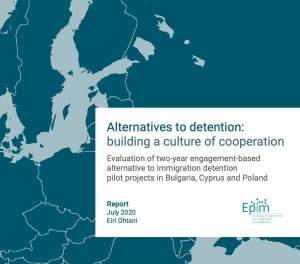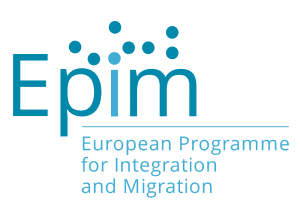New Evaluation Report
Building a Culture of Cooperation Through ATD
Written by Barbara Pilz and Mia-lia Boua Kiernan
Finalised in June, this report marks the end of a 2-year evaluation period of engagement-based alternative to immigration detention (ATD) pilot projects in Bulgaria, Cyprus and Poland. What can new data tell us about the pilots’ impact on individuals and their migration processes?
Why Evaluate?
Thorough evaluations of case management pilots can measure success factors at both personal and strategic levels. When it comes to individuals who are going through a migration process, evaluations measure the pilot’s impact on a person’s capacity and agency to work towards and stay engaged in their own case resolution. With regards to strategy, evaluations generate learning and evidence that contributes to national and regional discussions on reducing and ending immigration detention through the use of engagement-based ATD in the community, which is also one of the central goals of the EATD Network.
This particular evaluation measures the impact of case management on peoples’’ behaviour, approach and outlook over time. The evaluation also identifies the barriers to case resolution and makes recommendations for how case management processes and procedures can overcome these challenges. Further, the evaluation analyses whether the pilots have achieved the full benefits of ATD in terms of cost, compliance and well-being.
“A sustained and collaborative process of reform, based on the learning of the pilots and involving structured collaboration among governments, migrants, civil society and other actors, could deliver systemic improvements that would benefit all stakeholders.” (p. 3)
As part of this ongoing evaluation, an interim evaluation report was also published in 2018.
A Unique Exercise
The framework developed for this evaluation is the result of vigorous assessment and learning, and has been shaped through ongoing conversations, testing, and adjustments. This novel framework is part of a new social policy area that aims to guide ATD in order to resolve cases in a fair, timely, and humane manner based on people’s active engagement in their own cases.
This second evaluation is based on data collected in 2019, two years after the launch of the ATD pilot projects. When compared to the interim report, this evaluation brings more robust qualitative analyses due to a larger sample of qualitative data.
“The evaluation, on the whole, seeks to find commonality of impact of case management across the pilots rather than differences between the pilots. […] The evaluation aims to go beyond the basic quantitative questions that are frequently asked of ATD programmes, to understand at a qualitative level why ATD is or is not effective in helping individuals” (p.6)
With this intent in mind, the evaluation highlights that the purpose of the pilots is not to produce perfect quantitative results, such as fully avoiding absconding at any cost. Instead, pilots are stronger when their programming embodies a deep understanding of the complexity of case management interventions, their diverse contexts, needs and desired outcomes. Even when case management does not reach the intended result, understanding why things do not go according to plan is just as important as recognising when they do.

Evidence for Advocacy
In general, it’s a new practice to use case management to implement and evaluate community-based ATD. Evaluations provide an opportunity for implementers to learn from each other, and to regularly reflect on the complexity of their work on the ground.
Qualitative evidence from pilot evaluations can feed directly into strategic advocacy. Governments, civil society organisations and other stakeholders need qualitative evidence to uncover the true benefits of case management and encourage continuing and new practice of ATD. This advocacy leads to much needed migration management systems change that prioritises and values engagement over enforcement.
The three pilots are part of the European Alternatives to Detention Network alongside similar projects in Belgium, Greece, Italy, and the UK. This evaluation was commissioned by the European Programme for Integration and Migration (EPIM) and executed by Eiri Ohtani.
To learn more about the pilots, the methodology, and key findings read the full report here.






